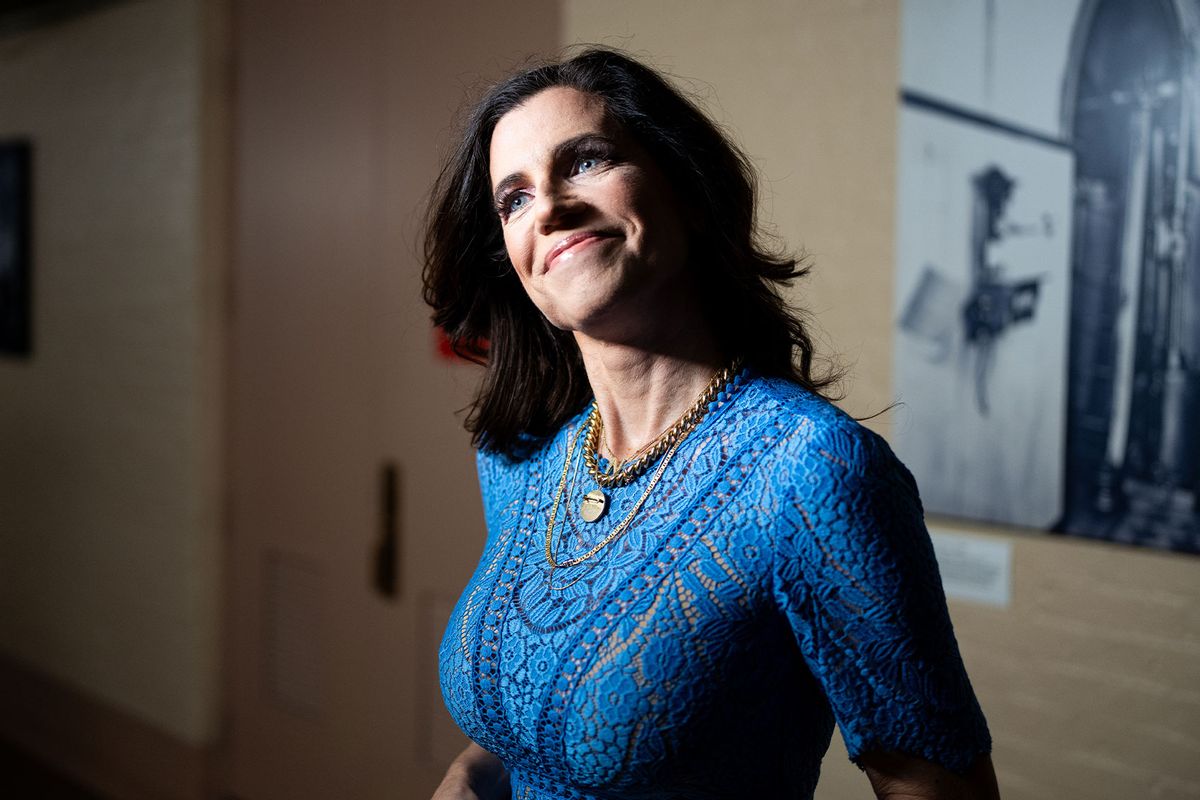At eight years old, Fatou Baldeh was told she would be attending a party at her uncle’s house to celebrate girls in her local community in The Gambia. Excited, she picked out a new outfit and braided her hair for the special occasion. “But that excitement suddenly changed,” she recalls decades later, “when we were all put in a line and blindfolded.”
With her eyes covered, Baldeh could only hear the sound of girls being taken to a bathroom nearby before shrieks of agony filled the room. “I still remember the scream of every girl,” she says. Soon after, a tight grip pinned her down to the floor, and an older woman—traditionally known in the community as a “cutter”—appeared, before using a razor blade to remove Baldeh’s genitals.
“This is how female genital mutilation is practiced in The Gambia,” Baldeh tells TIME at the 2024 Geneva Summit for Human Rights and Democracy in May, where the 40-year-old survivor received an International Women’s Rights Award for her advocacy efforts to put an end to the practice globally.
But Baldeh’s work is far from over. Female genital mutilation, or FGM, entails the deliberate cutting or removal of a female’s external genitalia for non-medical reasons through several different procedures. In 1997, the World Health Organization classified FGM (also sometimes known as female circumcision or FGC), into four different types of procedures, which can vary further through subtypes entailing the partial or total removal of clitoral glans.
Over 230 million women and girls alive today are FGM survivors—an alarming 15% increase from eight years ago, according to UNICEF. Africa accounts for the largest number of survivors with 144 million cases. And in 29 countries in Africa and the Middle East—including in countries that have put in place some form of legislation or decree banning FGM—the practice is still being widely carried out.
In the Gambia, the practice was outlawed in 2015 under the dictatorship of President Yahya Jammeh, who said it was not required under Islam. Yet, more than three-quarters of women and girls in the country have been subjected to it, according to the United Nations, because of religious beliefs that the partial or total removal of these body parts ensures that women remain chaste.
Now, a new bill tabled in Parliament by an independent lawmaker in March threatens to overturn the ban due to a push from influential Muslim clerics. If Gambia’s National Assembly adopts the Women’s (Amendment) Bill 2024 at its June session, it will become the first country in the world to overturn a ban on FGM. And what happens in Gambia could have a ripple effect across Africa, especially among Muslim-majority West African countries like Kenya and Guinea, warns Satang Nabaneh, a human rights law professor at the University of Dayton.
“There has been an uptick in [attempts to reverse] anti-FGM laws within the continent,” says Nabaneh, “and what happens in the Gambia will be a signal to other West African countries or conservative actors to roll back women’s sexual and reproductive rights, as well as to allow for gender-based violence.”
Why FGM is still prevalent
The reasons for practicing FGM can vary from country to country, but they are almost always rooted in social acceptance, cultural and religious beliefs, misconceptions about hygiene, or as a means of preserving a girl’s virginity.
In Somalia, where 98% of women have undergone FGM, the practice is seen as a religious requirement. Similarly, in the Gambian context, FGM is seen as “an obligation as a Muslim” that is also “deeply rooted as a rite of passage” among families, according to Baldeh.
“Parents will say, ‘This is what my grandmother did to my mother, and what she did to me, so now I have to do it to my daughter’,” she says.
These beliefs have also deemed talking about FGM openly taboo, especially to avoid criticism from outsiders, according to many of the women surveyed by Unicef and the WHO. “Growing up, nobody in my community said what was happening out loud, but every girl I knew went through that process,” Baldeh recalls.
However, most health professionals and human rights activists have long argued against the practice for its long-lasting health effects, including chronic pain, infections, difficult labor, and even death during the mutilation or after. “FGM is a devastating human rights abuse that has lifelong health and psychological consequences for women and girls,” says Nimco Ali, the CEO of the Five Foundation, an international organization working towards the elimination of FGM. “The act normalizes other forms of violence against women and girls, deepens inequalities, and increases poverty, especially in rural communities. “
The fight to overturn the FGM ban in the Gambia
In addition to banning the practice in 2015, the Gambian government also adopted a national strategy and policy last September to end the practice in the country by 2030. Despite the practice being outlawed, however, only two FGM cases have been prosecuted in Gambian courts to date, with the first conviction against performing FGM made last August.
What’s more, support for FGM still exists among the conservative members of its community. In March, lawmaker Almammeh Gibba further championed the bill in Gambia’s parliament to overturn the FGM ban, saying that the practice should continue to “uphold religious purity and safeguard cultural norms and values.”
The bill was tabled at a time when the Gambia Supreme Islamic Council, the main body of Muslim clerics in the country, repeatedly called for the ban to be scrapped. The clerics believe that the practice would not be considered mutilation if done properly.
As the Parliament discussed Gibba’s bill in March, outside the National Assembly, supporters of another Muslim cleric, Abdoulie Fatty, gathered to chant, “Female circumcision is my religious belief, Gambia is not for sale.”
But for many Gambian women’s rights activists, the writing is on the wall if the ban is reversed. “Whatever happens with this law, the consequences have already reached our communities,” says Baldeh.
“The religious leaders pushing for FGM are advocating for it during Friday prayers, asking families to cut their daughters, and making it seem as if those opposed are going against our religion because of Western ideologies,” she continues, “as a result, the community has shut down towards us.”
Human rights organizations also warn that overturning the ban would constitute a blatant human rights violation on Gambia’s part. Notably, the country is a signatory to numerous international bills for the rights of women, including the Convention on the Elimination of All Forms of Discrimination against Women (CEDAW), the Convention on the Rights of the Child, and the African Charter on the Rights and Welfare of the Child. It would also violate the principle of “equal dignity of the person” guaranteed in the Gambian Constitution.
“This bill would set a dangerous precedent for women’s rights and tarnish Gambia’s human rights record. We urge parliament to vote against it,” stated Michèle Eken, a senior researcher at Amnesty International’s West and Central Africa office.
The ripple effect in other African countries
Those advocating against the reversal of the FGM ban argue that such attempts are not isolated in Gambia, but are part of a global trend of rolling back progress on gender equality.
In many West African countries, this is happening by limiting the voices of women. In Sudan, for example, women’s rights activists protesting the country’s ongoing revolution have faced state-sanctioned violence and restrictions on public participation. In Tanzania, now-repealed laws that attempted to bar teenage mothers from attending public schools have since been repealed. And in Kenya, similar laws to repeal FGM bans were unsuccessfully brought to court in 2021.
“We’ve also seen this in countries like Egypt, where medical FGM has been allowed,” says Nabaneh, the law professor at Dayton University. “However, we know that medicalized FGM itself is a human rights violation rather than a harm reduction strategy.”
Ultimately, FGM is performed “to control women’s sexuality,” says Baldeh, referring to community narratives and pressures on young girls to be “chaste, clean and ready for marriage.”
But come June, if Gambia does reverse the ban on FGM, the consequences will be clear: “The health, education, bodily autonomy, and overall wellbeing for women and girls in our generation and future generations will be at risk,” she says.
“And this is how they will continue to hold us down.”




















Discussion about this post